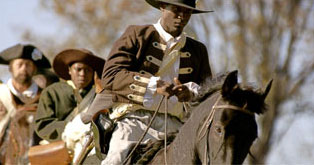
Revolution and Betrayal----“The slaves about Baltimore, Philadelphia, and New-York, have as good victuals as many of the English; for they have meat once a day, and milk for breakfast and supper...but alas, all these enjoyments could not satisfy me without liberty!” —Boston King, Black Loyalist As revolution began in the thirteen American colonies in the late 1770s, the British were badly outnumbered. In order to drum up recruits, Lord Dunmore, the Royal Governor of Virginia, offered freedom to Negroes "able and willing to bear arms." His strategy had both tactical and psychological ramifications, as southern planters were terrified of slave revolts.

By 1778, some thirty thousand of the enslaved had joined the English forces in Virginia, South Carolina, and Georgia. They were promised protection--as long as they fought on the side of the British--and their freedom after the war. Most of them worked as laborers, pilots, cooks, and musicians, although some were soldiers. Despite their service, the black Loyalists were betrayed when the British lost the war. Several thousand, mostly those fighting in the north, were evacuated as free men to British ports in England, Florida, and Nova Scotia. In the south and parts of the north, the British left their Negro allies in the hands of the colonial victors. Some blacks managed to escape, but most were resold into slavery, and left to fend for themselves in the new republic.
After the American Revolution, enslaved Africans had many strategies to continue resisting their oppression. From the beginning of the eighteenth century, slave rebellion had been an ever-present concern for whites, and the threat continued well after the defeat of the British. Alongside these spontaneous insurrections were the formation of the African Methodist Episcopal Church in 1794 and the birth of the Second Great Awakening in 1800. These developments provided less violent means to the fight for equality, centered on the cornerstones of faith, spirituality, and humanism.

Colonel Tye and the Black Brigade
He was born Titus, a black slave, in New Jersey. He escaped, making his way down to Virginia, where he responded to Lord Dunmore's call for soldiers. Colonel Tye, as he renamed himself, gained fame as a leader of New Jersey's Black Brigade, an elite guerilla unit. Once, Tye led a band of white and black troops in a sneak attack against the Patriot militia leader Joseph Murray, who was hated by the British for having executed Loyalists. Tye and his men assassinated him.
In the fall of 1780, Tye led another attack on a hated Patriot leader, Josiah Huddy. Tye was shot through the wrist during this attack and died from infection from the wound. By then, however, he had earned the respect of soldiers on both sides.

DID YOU KNOW Most black soldiers were sold back into slavery.
After the War--Of the tens of thousands of black soldiers who fought with the British, only a few thousand were recorded as having gone to Nova Scotia, London, or Sierra Leone when the war ended. Most of them were sold back into slavery, and spent the rest of their lives working on sugar plantations. (http://www.pbs.org/thisfarbyfaith/journey_2/p_2.html#PrintPage)



Of the slaves taken across the Atlantic, only 5% were taken to North America. In addition, the Atlantic slave trade was not in fact the largest forced migration in history. The forced migration of slaves taken by arabs dwarfed the Atlantic slave trade both in terms of numbers and their death rate.
ReplyDelete